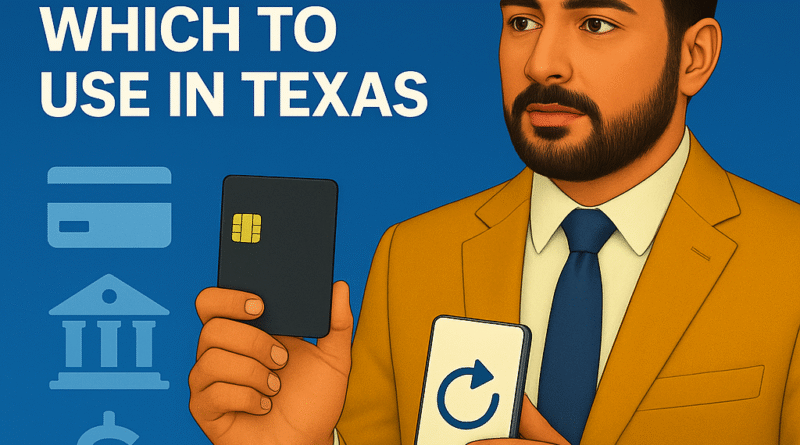Texas Chargebacks vs Refunds: The Fastest Way to Get Your Money Back
Texas consumer guide — Use this article to decide between asking a merchant for a refund or asking your bank/card issuer for a chargeback/dispute. It covers credit cards (FCBA/Reg Z), debit cards & ACH/Zelle (EFTA/Reg E), Texas-specific escalation (Texas AG & Justice Court), timelines, evidence, and pitfalls.
Chargeback vs. Refund — what’s the real difference?
Refund = merchant-driven fix. You work directly with the business for your money back, replacement, or store credit under its policy, warranties, or Texas consumer law (e.g., DTPA for deceptive practices). It’s fast when the business cooperates, and it keeps relationships intact.
Chargeback / Bank dispute = issuer-driven reversal. You ask your card issuer or bank to reverse a transaction because of billing errors (credit cards) or errors/unauthorized EFTs (debit/ACH). Networks and federal rules impose strict notice windows and investigation deadlines. It’s powerful when a merchant refuses to help or the transaction is fraudulent.
Snapshot: When each path shines
- Use a refund when: the item is returnable per policy; quality issues are acknowledged; you’re inside the seller’s return window; you prefer store credit or an exchange; you want to avoid a network dispute mark on the merchant.
- Use a chargeback/dispute when: the charge was unauthorized; goods/services were not delivered or not as agreed; the merchant refuses to honor a clear policy; or you are outside the return window but squarely within federal error resolution rules.
Decision matrix (Texas-focused)
| Scenario | Refund path | Chargeback/dispute path |
|---|---|---|
| Clearly posted 30-day returns, within window | Ask the merchant; expect refund/exchange per policy | Usually unnecessary unless merchant refuses |
| Item never arrived or was the wrong product | Request refund citing non-delivery or not as described | Credit cards: billing error claim; debit/ACH: error claim |
| Unauthorized card use | Merchant usually can’t help | Go straight to issuer (fraud/unauthorized transfer rules) |
| Service was shoddy or deceptive sales tactics | Escalate with merchant; cite DTPA claims as leverage | If not resolved: dispute for “not as agreed”/billing error |
| Return window closed but warranty exists | Use manufacturer warranty first | Possible if “not as agreed”/non-delivery fits Reg Z; otherwise weaker |
Timelines (visual)
Below are generalized windows. Always check your receipt/card agreement.
Credit card (billing error, Reg Z) — notify within 60 days of the statement that lists the error. Issuer acknowledges within ~30 days and investigates, typically resolving within two billing cycles (≤90 days).
Debit/ACH (Reg E) — report within 60 days after the statement was sent. Bank investigates promptly and often must provide provisional credit if it can’t finish within 10 business days (some accounts up to 20) and generally conclude within 45 days (up to 90 for certain cases).
Refunds — policy-based (often 14–90 days). Texas does not impose a universal refund/return law; outcomes depend on the posted policy, warranties, and deception rules.
How to pursue a refund effectively (Texas)
- Collect proof: order confirmation, invoices, photos/video of defects, delivery tracking, chat/email transcripts, policy screenshots.
- Contact the seller: use the listed customer service channel; describe the issue and the exact remedy (refund/exchange/repair). Ask for an RMA/return label when delivery or description failed.
- Escalate: supervisor, written demand by email, then a formal demand letter referencing potential claims under the Texas Deceptive Trade Practices Act (DTPA) if there are false/misleading acts.
- Document deadlines: return-by dates, restocking fees, and “as-is” terms. Keep postal proof.
- If refused: move to a card dispute (see below) and consider Texas AG complaint for patterns of deception; for modest amounts you can use Texas Justice Court (small claims) after giving proper notice.
Texas tip: There is no general state-wide right to a refund or “3-day cooling-off” for ordinary retail sales. Policies vary by business; certain door-to-door and niche contracts have special cancellation rights. Keep your receipt and photograph the posted policy at purchase.
How to pursue a chargeback/dispute (credit cards)
- Act within 60 days of the statement date listing the charge. File online or in writing describing the billing error: unauthorized use, non-delivery, or goods/services not as agreed.
- Provide evidence: order records, timelines, photos, delivery scans, merchant denials, chats, policy captures. Organize chronologically.
- Issuer obligations: acknowledge receipt (about 30 days), investigate, and resolve typically within two billing cycles (≤90 days). During the investigation, you may withhold payment of the disputed amount; late fees/interest on the disputed amount should be paused if you gave proper notice.
- Merchant response (“representment”): merchants can rebut with proof (delivery, acceptance, policy). If you still disagree, request the bank’s final determination in writing and the evidence relied upon.
How to pursue a debit/ACH/Zelle dispute (Reg E)
- Report quickly: immediately notify your bank and follow up in writing if asked within 10 business days of your oral report.
- Expect “provisional credit” when investigations take longer: if the bank cannot finish in 10 business days (some accounts up to 20), it generally must credit your account temporarily while it continues investigating (exceptions apply to new accounts/international transactions).
- Provide detail: dates, device/IP if known, police report for theft, screenshots of phishing/SIM-swap, correspondence with the merchant, and confirmation that you did not authorize the transfer.
- Bank decision: most cases conclude within 45 days (up to 90 for certain transactions). If the bank denies, request the written findings and appeal internally; then escalate to the appropriate regulator.
Evidence playbook (maximize approval odds)
- Timeline: a clean date-stamped sequence from order → promised ship/perform date → communications → delivery/failure.
- Proof of non-delivery/return: tracking pages, carrier scans, signature records, drop-off receipts.
- “Not as agreed” proof: product listing captures, photos/video, expert diagnosis for repairs/services, and correspondence where the seller admits issues.
- Fraud indicators: device change, new payee, geolocation mismatch, IP logs, SIM-swap ticket, police report, identity theft affidavit.
Common pitfalls in Texas
- Waiting too long: missing the 60-day notice window for FCBA/Reg Z and Reg E severely weakens your case.
- Relying on a “universal refund right”: Texas does not impose a general return/refund mandate; merchant policy governs unless deception or special statutes apply.
- Friendly-fraud risk: disputing a legitimate charge you simply regret can backfire; merchants keep blacklists and networks track excessive disputes.
- Return issues: failing to send items back with tracking/RMA or ignoring restocking fees can sink both refund and chargeback claims.
- P2P transfers: Zelle/Venmo “mistake” payments are hard to unwind unless unauthorized. Treat account security seriously (2FA, SIM-swap protection).
Escalation in Texas (if you need more leverage)
- Regulators/complaints (after trying the issuer/merchant): CFPB (card and bank disputes), Texas Attorney General Consumer Protection, bank’s primary federal regulator (FDIC, Federal Reserve, OCC) depending on the institution.
- Texas Justice Court (small claims): for modest claims related to refunds or chargeback losses; attach your evidence, demand letter, and communications. Consider DTPA claims if deception is strong (consult counsel).
Quick Guide — What to file today
1) If the charge was unauthorized: Call your bank/issuer now, freeze the card, change logins, file a Reg E (debit/ACH) or fraud claim (credit). Follow up in writing if requested within 10 business days. Ask about provisional credit and investigation timing.
2) If goods/services weren’t delivered or not as agreed: Email the seller and request a refund referencing the order, what went wrong, and the exact remedy. If rejected or ignored within a few days and you’re inside the 60-day billing error window, file a credit card dispute (Reg Z) or debit error claim (Reg E) with your documentation.
3) Build your file: order confirmations, photos/video, shipping scans, policy screenshots, chat/email logs, and a clean timeline. Write a short cover note with bullet points that map each document to your claim reason.
Further reading:
4) Escalate smartly in Texas: persistent merchants → Texas AG complaint for deception patterns; issuer denials → CFPB complaint and regulator of the bank; damages unresolved → consider Justice Court and, where applicable, DTPA remedies (talk to a lawyer).
FAQ (Texas, plain English)
1) Is a chargeback faster than a refund?
Not always. A cooperative merchant can refund within days. Bank disputes have formal steps and can take up to 90 days (credit cards) or 45–90 days (Reg E) depending on complexity.
2) Do Texas stores have to give refunds?
No general rule forces refunds on ordinary sales. Policies control unless a law (e.g., misrepresentation, specific cooling-off statutes) applies. Keep the receipt and the posted policy.
3) I missed the 60-day dispute window—what now?
Still ask the merchant for help and complain to regulators if there was deception. For debit fraud, banks may still assist, but protections are strongest if you notify within 60 days of when the statement was sent.
4) Can I dispute a Zelle payment I sent by mistake?
Generally no if you authorized it. If your account was compromised (unauthorized), pursue a Reg E claim. Otherwise, ask the bank to reach out to the recipient’s bank and file a police report.
5) Will a dispute hurt my credit?
Properly opened disputes shouldn’t hurt your score; interest/late fees on the disputed amount are paused for valid billing error claims. Pay the rest of your statement to avoid interest.
6) The merchant claims “all sales final.” Can I still win?
Yes, if there’s non-delivery or goods/services not as agreed, or if the sale involved deception. “All sales final” does not shield fraud or failure to perform.
7) What proof carries the most weight?
Carrier scans, RMA records, product listing screenshots, written policy captures, photos/video, technician reports, and a clear timeline that aligns with your claim reason code.
8) What if my bank denies my Reg E claim?
Request the written findings, the evidence relied on, and the right to appeal. Then file a CFPB complaint and contact the bank’s primary regulator. Consider Justice Court for damages.
9) Can I do both—ask for a refund and file a chargeback?
You can start with a refund and switch to a dispute if refused, but don’t accept a refund and keep a dispute open; double recovery can lead to a reversal and account consequences.
10) When does the Texas DTPA help me?
When the business used false, misleading, or deceptive acts (e.g., promising features that don’t exist). A lawyer can assess DTPA claims; successful suits can award damages and, for “knowing” violations, up to treble damages.
Conclusion
Start with the path that fits your facts: merchant refund for cooperative policy-covered returns, and federal dispute rights for unauthorized charges or failures to deliver/perform. Track the 60-day notice rule, assemble evidence, and escalate methodically. In Texas, because no universal refund statute exists, the combination of clear documentation, federal dispute rights, and DTPA leverage gives you the best chance of getting your money back with minimal delay.

